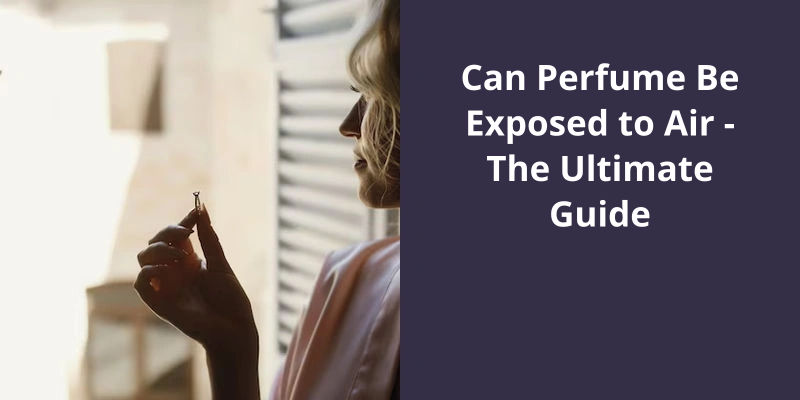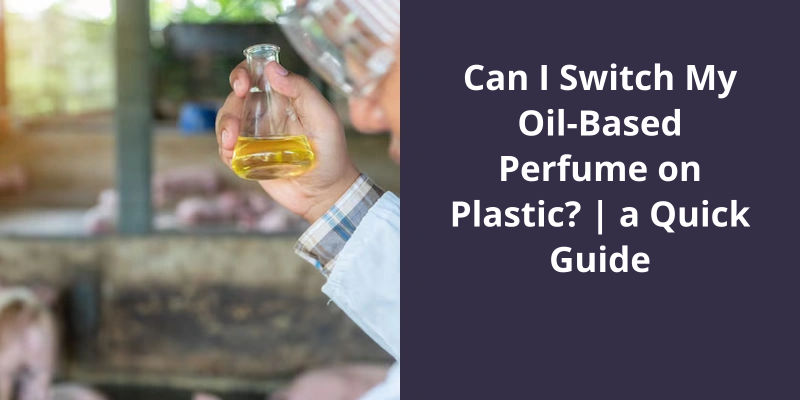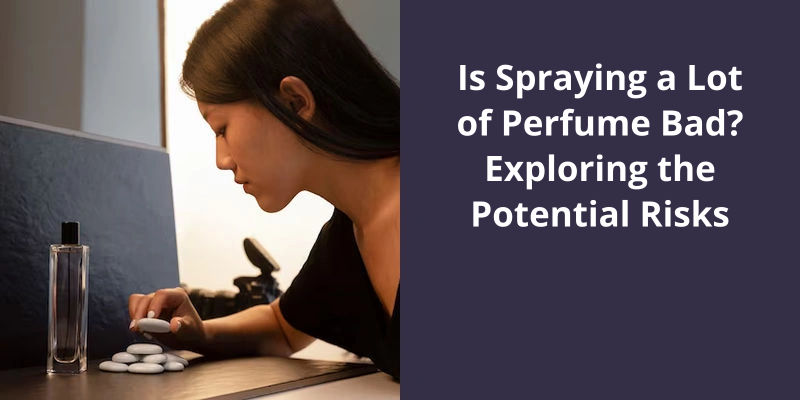This ultimate guide aims to shed light on the potential effects of exposing perfume to air and provide valuable insights into it’s preservation. Perfumes, consisting of volatile molecules that delicately interweave to create distinct aromas, are highly susceptible to evaporation when exposed to air or heat. The fragrant molecules responsible for an enchanting scent can be easily compromised when subjected to light or elevated temperatures.

What Happens to Perfume in Air?
What happens to perfume in air? Being a compressed chemical composition, once the perfume or cologne is sprayed into the air, it coverts into a gas and it’s particles are mixed with other air particles. These particles very quickly circulate the room while the perfume spreads.
As the perfume molecules disperse into the air, their concentration gradually decreases. This is because the perfume particles mix with other air particles, increasing the overall volume. The rate at which this happens depends on various factors like temperature, humidity, and air circulation.
This is why you may notice that the fragrance doesn’t last as long in the air compared to when directly applied on the skin.
Oxygen in the air can interact with and potentially alter the fragrance molecules, leading to a change in scent or even degradation of the perfumes quality.
Proper storage, away from excessive heat, light, and air exposure, can help prolong the fragrances lifespan and maintain it’s original scent quality.
Additionally, exposure to air can potentially cause chemical changes in the perfume itself.
The Science Behind Perfume Molecules and How They Interact With Air Particles.
- Perfume molecules are composed of various chemical compounds.
- These molecules can be volatile, meaning they can easily evaporate into the air.
- When perfume is sprayed or applied to the skin, the molecules begin to interact with the air particles.
- As the molecules evaporate, they create a cloud of scent around the person wearing the perfume.
- The size and shape of the perfume molecules can affect how they interact with the air particles.
- Smaller molecules are more likely to disperse quickly, creating a lighter and more diffuse scent.
- Larger molecules may be heavier and stay closer to the body, creating a stronger and longer-lasting scent.
- Perfume molecules can also interact with other molecules present in the air, such as oxygen or pollutants.
- These interactions can alter the scent of the perfume and affect it’s longevity.
- The temperature, humidity, and airflow in the environment can also impact how perfume molecules disperse and interact.
Instead, it’s best to apply perfume directly onto your skin. This allows the fragrance to interact with your body’s natural oils, enhancing it’s longevity and sillage. By focusing on pulse points such as the wrists, neck, and behind the ears, you can create a more intimate and personal scent experience. Let’s explore the importance of proper application methods and how they can enhance the overall fragrance experience.
Can You Spray Perfume in the Air?
Can perfume be exposed to air? Many people wonder if this method of application is effective or wasteful. While it may seem convenient to spritz perfume into the air and walk through the mist, experts advise against this technique.
Another factor to consider is the potential drying effect of alcohol-based fragrances on your hair. Spraying perfume into your hair may seem enticing, but the alcohol content can be drying and damaging. Experts suggest avoiding this technique, especially if you’ve naturally dry or brittle hair. It’s best to opt for hairstyling products specifically designed to impart a pleasant scent without compromising the health of your locks.
To maximize the longevity of your perfume, it’s recommended to apply it directly onto your skin. This allows the fragrance to interact with your body heat and natural oils, enhancing it’s scent and ensuring it lasts longer throughout the day. Additionally, applying perfume to pulse points, such as the wrists, neck, and behind the ears, allows the scent to disperse more effectively.
The Science Behind How Perfume Interacts With the Air and the Surrounding Environment
Perfume, being a volatile liquid, easily interacts with the air and the surrounding environment through a process known as evaporation. When perfume is sprayed or applied, it releases volatile molecules into the air. These molecules then diffuse in the surrounding atmosphere, allowing us to smell the fragrance.
As the perfume molecules evaporate, they undergo chemical reactions and mix with the oxygen in the air. This interaction can cause changes in the scent, as some molecules may break down or oxidize. Exposure to the air can also lead to the gradual loss of volatile compounds, affecting the fragrance’s intensity and longevity over time.
Proper storage of perfume is crucial to minimize air exposure. Keeping perfumes in tightly sealed bottles, away from direct sunlight, heat, and fluctuations in temperature, can help maintain their quality and prevent unnecessary evaporation.
Source: Is there anything wrong with spraying your perfume into the …
New research has raised concerns over the potential harm caused by petroleum-based chemicals used in perfumes, paints, and other household items. It’s been discovered that these substances, collectively known as volatile organic compounds (V.O.C.s), can contribute to air pollution at levels comparable to those produced by motor vehicles. This revelation has sparked questions about the consequences of spraying perfume in the air and the wider implications of using consumer products containing such chemicals.
Is Spraying Perfume in the Air Bad?
Perfume is an integral part of our daily routine, adding fragrance to our lives and enhancing our personal style. However, recent research has shed light on a concerning aspect of perfumes and their potential impact on air quality. It’s been discovered that the petroleum-based chemicals found in perfumes, as well as other consumer products such as paints, can emit a significant amount of volatile organic compounds (V.O.C.s) into the air.
V.O.C.s are known to contribute to air pollution and can have detrimental effects on both human health and the environment. When these chemicals are released into the air, they can react with other pollutants and sunlight, forming ground-level ozone, which is a major component of smog. This can lead to respiratory problems, eye irritation, and even cardiovascular issues. Moreover, the long-term exposure to V.O.C.s has been linked to various health complications, including the potential to cause cancer.
Considering the potential harm associated with V.O.C.s, it’s advisable to exercise caution when using perfumes and similar products. Instead of spraying perfume directly into the air, it’s recommended to apply it directly to your body, using gentle spritzes on pulse points such as your wrists or neck. By doing so, you can minimize the release of V.O.C.s into the surrounding environment and limit your own exposure to these potentially harmful chemicals.
Furthermore, it’s also important to be mindful of the ingredients present in perfumes. Opting for fragrances that are made from natural and organic ingredients can be a healthier choice, as they often contain fewer petroleum-based chemicals and synthetic additives. Reading labels and researching brands can provide valuable insight into the composition of perfumes, helping you make informed decisions about the products you choose to incorporate into your daily routine.
The Impact of Perfumes on Indoor Air Quality and Potential Health Risks
- The use of perfumes indoors can lead to poor indoor air quality.
- Perfumes contain a variety of chemicals, such as volatile organic compounds (VOCs), which can be released into the air and contribute to air pollution.
- Exposure to high levels of VOCs from perfumes can cause respiratory irritation, headaches, dizziness, and other health problems.
- Individuals with asthma or other respiratory conditions may be more sensitive to the effects of perfumes on indoor air quality.
- Using fragrance-free or natural alternatives can help reduce the impact of perfumes on indoor air quality.
- Proper ventilation, such as opening windows or using air purifiers, can also help improve indoor air quality when perfumes are used.
- It’s important to consider the potential health risks associated with perfumes when using them indoors, especially in enclosed spaces.
- Research and studies are ongoing to better understand the long-term effects of perfume exposure on indoor air quality and human health.
What Can Damage a Perfume?
Additionally, exposing perfume to direct sunlight can also cause damage. The UV rays in sunlight can break down the chemical compounds in the perfume, altering it’s scent and reducing it’s longevity. This is why it’s important to store perfumes in a cool, dark place, away from windows or any other sources of direct sunlight.
Another factor that can damage perfume is excessive heat. When exposed to high temperatures, the delicate chemical compounds in the fragrance can become unstable and break down. This can’t only affect the scent of the perfume but also it’s overall quality. Therefore, it’s best to avoid storing perfumes in areas that are prone to high temperatures, such as near radiators or in hot attics.
Air exposure can also have a negative impact on perfume. When exposed to air for a prolonged period of time, some perfumes can oxidize, leading to a change in scent and a reduction in their potency. To minimize air exposure, it’s recommended to always tightly seal the perfume bottle after each use and store it in it’s original packaging or airtight containers.
Furthermore, contact with liquids can damage perfumes. Spills or leaks can’t only cause wastage but can also alter the chemical composition of the fragrance.
Lastly, using improper application techniques can also damage the fragrance. Rubbing or vigorously shaking the perfume bottle can introduce excess air into the liquid, which may lead to oxidation and a change in scent. To preserve the integrity of the perfume, it’s best to apply it by spraying lightly and without excessive agitation.
However, even with proper storage, perfume can still go bad over time due to factors such as age, temperature fluctuations, and exposure to sunlight. It’s important to know the signs of a perfume gone bad, as using expired fragrance can result in skin irritation or an unpleasant scent.
Does Perfume Go Bad if Exposed to Air?
Perfume aficionados often wonder whether their beloved scents can go bad if exposed to air. The answer lies in understanding the nature of perfumes and how they interact with their environment. For optimal longevity and preservation, perfume is best stored in a cool, dry, and dark place. This could be a bedroom drawer or closet, away from direct sunlight or extreme temperatures.
Keeping perfume in it’s original container is highly recommended to protect it from air exposure. When perfume comes into contact with air, it can disrupt the delicate chemical balance that gives it it’s unique fragrance profile.
Furthermore, exposure to air can accelerate the evaporation process of the alcohol present in the perfume. Alcohol serves as a carrier for the fragrance oils and helps disperse the scent when applied.
To maintain the fragrances potency and extend it’s shelf life, it’s essential to minimize air exposure as much as possible. This includes tightly sealing the perfume bottle after each use and avoiding unnecessary exposure to oxygen for extended periods.
While the general rule is to avoid exposing perfume to air, it’s important to note that individual results may vary.
How to Properly Store Perfume to Minimize Air Exposure and Maintain It’s Quality
- Keep perfume in it’s original packaging to protect it from light and air exposure.
- Store perfume bottles in a cool and dry place, away from direct sunlight and extreme temperatures.
- Avoid storing perfume in the bathroom, as the humidity can negatively affect it’s quality.
- Ensure that the cap or stopper is tightly closed after each use to prevent air from entering the bottle.
- Consider using a perfume tray or drawer to organize and protect your fragrance collection.
- If you’ve multiple perfumes, avoid storing them too close together to prevent the scents from mixing.
- For long-term storage, consider using airtight containers or wrapping the perfume bottle in plastic wrap to minimize air exposure.
- Avoid shaking the perfume bottle vigorously, as this can introduce air bubbles which may alter the fragrance.
- Don’t store perfumes near household chemicals or strong-smelling substances, as they can affect the fragrance.
- Check the expiration date of your perfumes and discard any that have expired to maintain the quality of your collection.
Conclusion
This vulnerability to external elements such as light and high temperatures can lead to damage and alterations in the aroma. Therefore, it’s imperative to store and handle perfumes with caution, preserving their integrity and ensuring a longer-lasting olfactory experience.





